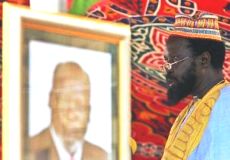Sudan’s Kiir, from Garang’s shadow to international limelight
By Paul Ejime
DAKAR, Senegal, Aug 12, 2005 (PANA) — In comparison to the late charismatic
John Garang, whom he succeeded Thursday as Sudan’s First
Vice-President, Salva Kiir Mayardit is an unknown political
quantity, that struggled for more than two decades under the giant shadow of his former boss, in the leadership of the former rebel Sudan People’s Liberation Movement/Army (SPLM/A).

|
|
The new SPLM leader Salva Kiir addresses mourners during the funeral service for late rebel leader and first vice president John Garang in Juba, southern Sudan August 6, 2005. (Reuters) . |
In one of his few photographs that have made the international
media, heavily bearded Kiir sports an almost oversized bowler
hat that betrays a lanky figure that is in sharp contrast to
Garang’s commanding appearance.
Both men are dark and Dinka, the largest tribe in southern
Sudan, although from different clans, but that is as far as
their similarities go in terms of international visibility.
Garang was an intellectual, who combined politics with military
profession, unlike soft-spoken Kiir, whom associates called a
soldier’s soldier, who is more comfortable among troops than
among politicians.
Indeed, much of the military campaign successes of the SPLM/A
in its separatist struggle to emancipate Sudan’s Christian and
traditional religion adherents-dominated South, from the
Muslim-dominated North is credited to Kiir.
This military prowess and popularity in the South is evidenced
by the fact that on several occasions that Garang had attempted
to replace Kiir as his number-two man, the moves had always failed.
Such moves were reported in 2004 and even as late as the first
week of July, before Garang made his triumphant return to Khartoum
after 20 years in the South.
But following Garang’s sudden death 30 July in a helicopter crash
just three weeks as Sudan’s First Vice-President, fate has changed
political fortunes of Kiir, who had joined the southern rebels in
the 1960s in the First Sudanese Civil War.
By the time of the peace deal of 1972, he had become an officer in
the rebel forces and found a position in the regular army.
When Garang joined an army mutiny that he had been sent to quell
in 1983 the South, Kiir joined with him to set up the Sudan People’s
Liberation Movement (SPLM), and rose to head its military wing –
the SPLA.
Kiir has also distinguished himself in the history of negotiating
with the Khartoum government and was very much involved in the
early stages of negotiating the peace agreement that ended the
civil war in the south, if under Garang’s towering shadow.
Kiir’s selection by the SPLM/A leadership to succeed Garang was
seen by analysts as a clear signal that they intended to keep
the peace process on course, despite Garang’s sudden
death.
Speaking at Garang’s funeral in Juba, southern Sudan 6 August,
he called on all Sudanese to unite and remain focused on the
implementation of the Comprehensive Peace Accord.
According to him, of all the surviving founding leadership of
the SPLM, “nobody is more pained and chagrined by the loss of
De Mabior (Garang) than myself.”
Kiir has also rejected suggestions that he was more inclined
to independence for the south above a united Sudan.
“It is a dangerous sport to second-guess what Salva Kiir
stands for,” he protested.
History is replete with character transformation of political
actors.
It remains to be seen whether Kiir the soldier can transform
into an effective politician, that would not only hold the SPLM/A
together like his mentor, but also move the Sudan peace process
forward even beyond the south to the east and western region of
Darfur.
As Sudan’s new First Vice-President and President of the South,
under the January accord that ended the war in the South, he
must now shed his recluse inclination and military garb to
embrace politics in his restive multi-ethnic and culturally
diverse country where separatist wars have claimed more than
two million lives and displaced millions more.
